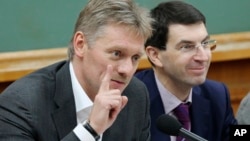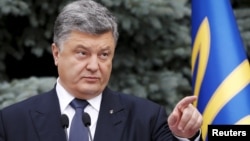Russia expressed "deep concern" on Thursday over Ukraine's plans to decentralize power as part of a peace deal with separatist rebels, underlining the gulf between Moscow and Kyiv as the conflict rumbles on despite a cease-fire.
Differing interpretations of a February peace agreement signed in Minsk, Belarus, to end the fighting in Ukraine's eastern regions have left the conflict in limbo, with more than 6,500 people killed since it broke out in April last year.
Adding to the tensions, negotiations broke down in Vienna this week over Russian gas supplies to Ukraine, leading to imports being halted at the border between the two ex-Soviet countries.
Ukraine and the West accuse Moscow of arming and supporting pro-Russian rebels fighting government troops. Moscow denies the charges.
Ukrainian President Petro Poroshenko on Wednesday presented a blueprint to give Ukraine's regions more powers and control over their budgets, one of 13 points in the Minsk deal that would allow the rebel-controlled regions a degree of self-governance.
He said the moves would amount to a "vaccination" against federalization, which Kyiv says would give the separatist-minded regions too much independence and allow them to block Ukraine's shift towards joining the European mainstream.
Moscow has said it favors much more autonomy for the self-proclaimed people's republics of Donetsk and Luhansk, collectively known as the Donbass, although they should remain part of Ukraine.
Voicing Russia's concern, Kremlin spokesman Dmitry Peskov told reporters: "The preparation of such laws without taking into consideration the opinions of the representatives of the Donbass can hardly be seen as the fulfilment of the Minsk agreements."
Alternative to 'despotism'
Poroshenko pointedly described the Ukrainian plan as an alternative to "despotism."
"Finally, decentralization will become another civilizational difference from our post-Soviet neighbors," he told reporters. "True self-government is impossible in an authoritarian state. Despotism admits neither independence of communities, nor freedom of its citizens."
Alexander Zakharchenko, self-appointed head of rebel-held parts of the Donetsk region, complained he and his Luhansk counterpart Igor Plotnitsky had not been consulted over the changes.
"Neither I, nor my colleague Plotnitsky, gave agreement to Poroshenko's proposed conception of constitutional reform," he told the DAN rebel news agency.
Donetsk has called a local election for October 18, a week before the rest of Ukraine, a move that would be "destructive", Poroshenko was quoted by Interfax-Ukraine news agency as saying.
Gas spat
Meanwhile, Ukraine expects to store enough natural gas for next winter despite cutting off imports from Russia and Russian flows crossing the country destined for Europe will not be disrupted, Energy Minister Volodymyr Demchyshyn said on Thursday.
State energy firm Naftohaz stopped buying gas from Russia's Gazprom on Wednesday after energy ministers from Kyiv and Moscow failed to agree on quarterly prices.
"The suspension of deliveries will not affect the safety or transportation of gas [to Europe]... or preparation for the new heating season," Demchyshyn said.
"Everything depends not on the presence of Russian flows, but on the availability of money [to buy gas]," he said.
He said Ukraine had been pumping about 60 million cubic meters of gas a day into storage before it stopped buying from Russia and was likely to store about 18 billion cubic meters (bcm) by mid-autumn from its own supply and from Europe.
Ukraine currently has about 12 bcm of gas in reserve, Demchyshyn said.
Russian energy officials have said Ukraine needs to have at least 19 bcm of gas in storage to ensure stable gas transit to Europe in the winter, but Demchyshyn said that 16.6 bcm, the volume which Ukraine had last year, would be enough.
The European Union depends on Russia for around one third of its gas and about half of that is piped via Ukraine.
Demchyshyn said that Ukraine did not plan to supply gas to eastern rebel areas this year and that Ukrainian gas consumption had decreased by 20 percent compared with last year.
Last year, Ukraine exhausted its reserves after supplying about 2 bcm of gas to separatist parts of the Donetsk and Luhansk regions which did not pay for the deliveries.






